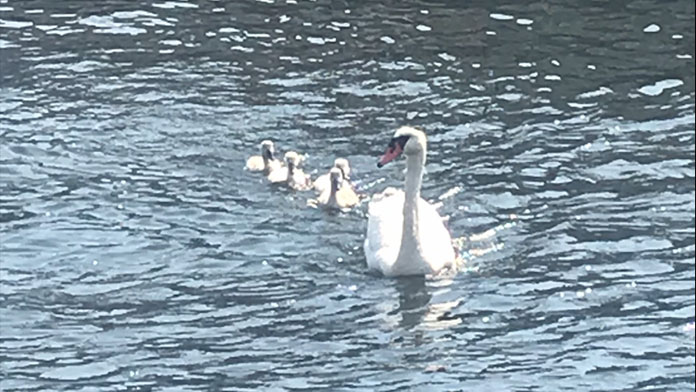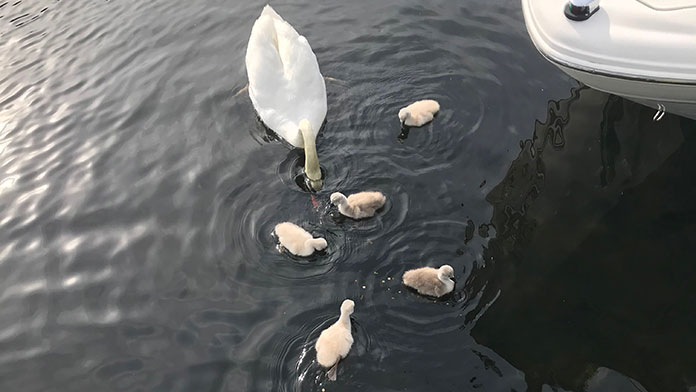
BRICK – Reports of an aggressive swan living in a Brick lagoon reached the desk of State Director of the USDA Wildlife Service Aaron Guikema. The agency works in conjunction with the NJ Division of Fish and Wildlife, who are responsible for setting rules and regulations for swans, which is a protected species in the state.
A number of complaints from residents living in the Baywood Shores community on the barrier island said that a male swan, who is part of a family that includes four cygnets, was chasing people on the land and in boats on the water.
Guikema said the agency’s policy is to send a wildlife technician out in a kayak or a boat to observe the swan’s behavior.
“That’s what we did on August 3,” he said in a recent phone interview. “The wildlife technician saw a total of five swans, and none were acting aggressively, so in that situation we made no attempt to capture the bird.”
The wildlife technician might go out again if there are more complaints, he added.
If the technician had observed an aggressive swan, the agency would capture it and “unfortunately, euthanize it,” he said.
The swan might have been protecting his young, or sometimes so-called aggressive behavior is learned when people feed them, and the birds associate people with food, Guikema said.
“Some people look at that as aggressive,” he said.
It’s very rare that a swan is euthanized. There have been none this year and only a handful last year, he said.
Baywood Shores resident Laura Paglia said she has observed wave runners who don’t respect their distance and come too close to the family of swans.
“Several neighbors feed the swans – it’s one of the joys of living on the water,” she said in a phone interview. “Certain families are not happy with the swan. I don’t want to paint families in a bad light, but they should teach their children to respect wildlife. We can co-exist,” she said.
“People need to appropriately distance themselves. The dad was just trying to protect his offspring,” Paglia said.

After NJ Wildlife Services did their assessment, Paglia said she has stopped feeding the swans.
“My goal is to educate families. I just can’t see that anyone would want to euthanize a swan,” she said.
In addition to swan control, Guikema said his agency also relocates or euthanizes aggressive turkeys, which can become traffic hazards, and deer, which can become trapped or entangled.
However, the majority of their work is airport management and wildlife hazards, such as keeping geese and deer away from airports.
“On a final note, keep wildlife wild,” Guikema said. “Don’t feed them. If a swan is approaching your boat, just keep going.”
There are a couple of things people can do to keep swans off their property, he said. Aside from not feeding them, put down a couple of stakes and run some twine along the property line, which would create a barrier.
“It helps to eliminate situations where swans are a nuisance,” he said. “We only remove a swan as a last resort when it is in the interest of public health and safety. We don’t indiscriminately remove swans.”






